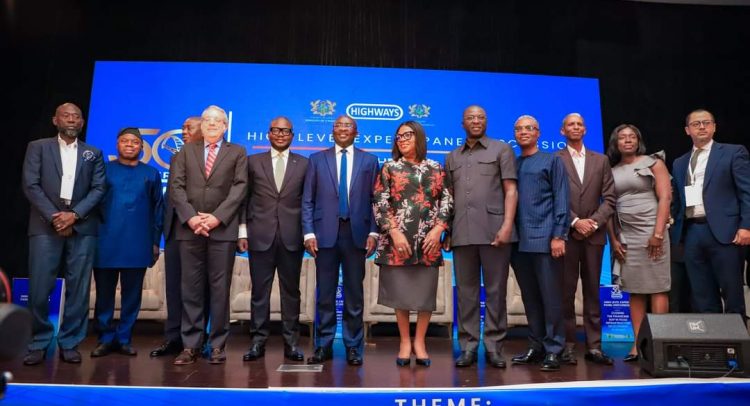Dr. Mahamudu Bawumia (M) in a photo with some Ministers of State and other dignitaries
Vice President, Dr. Mahamudu Bawumia, says Public-Private Partnerships (PPP) is one of the surest ways to bridge the financing gap in road infrastructure in order to enhance economic development.
Speaking at the 50th Anniversary of the Ministry of Roads and Highways high- level expert discussion in Accra on the theme, “Closing the Financing Gap in Road Infrastructure Development in Ghana,” he said such collaboration between the public sector and private investors would help the country unlock new funding streams and leverage expertise in project implementation.
According to him, successful PPPs have been implemented worldwide and have demonstrated their potential to deliver infrastructure projects on time and within budget.
He said recent estimates indicate that the country required $12 billion to clear the maintenance backlog to enable the road network of about 94,203 kilometres to be at an optimal level.
He said the current funding levels cover only about 38% leaving a significant shortfall which has translated into deteriorating road conditions, increased maintenance costs, and missed economic opportunities.
That staggering figure, he explained, therefore underscores the importance of innovative solutions and strategic partnerships and relationships with construction firms, engineering companies and technology innovators who can provide financial support.
“Public-Private Partnerships (PPPs) are vital for sharing the responsibilities and rewards of infrastructure development. Such collaborations often lead to improved quality of infrastructure and can significantly reduce the burden on public finances, allowing for the reinvestment of savings into other essential areas,” he added.
He said even though the government has prioritised infrastructure development and has made significant strides in expanding and improving the road network, there is still more to be done.
“Closing the financing gap in road development is not a task we can achieve alone. It requires collaboration, innovation, and a shared commitment to sustainable development,” he said.
“By embracing these principles, I am confident that we can build a road network that supports our economic ambitions and enhances the quality of life for our citizens,” he stated
He also mentioned the government’s preparedness to lead the effort in working with all stakeholders to transform the country’s infrastructure landscape to pave the way for a brighter and more connected future.
The Vice-President further said that the government has taken proactive steps to create an enabling environment for PPPs, streamlining regulatory processes and offering incentives to attract private investment.
“It is evident that we need to discuss a major paradigm shift in road financing at this technical forum. Some areas you might consider include the concession of high-volume roads over a period. This could be done on major trunk roads like Accra-Kumasi, Accra-Cape Coast, Accra-Akosombo as well as new ring roads/ expressways around our major urban centres,” he said.
Among some of the funding streams, Dr. Bawumia mentioned are infrastructure bonds, road funds, and toll systems that will provide dedicated funding for road development and maintenance.
The flag bearer of the New Patriotic Party (NPP) also proposed that the broadening of the tax base and improved tax administration to improve revenue collection, generate additional revenue to support road projects with the involvement of the citizens.
“We believe that by engaging with local communities and stakeholders, we can foster a culture of contribution and support for development initiatives,” he said.
“We acknowledge the potential of high-income neighborhoods to propel road development projects. By collecting property rates in these areas, we can create additional revenue dedicated to road maintenance and improvements, with transparency on how these funds will benefit the community,” he added.
By Ebenezer K. Amponsah


